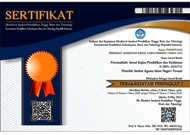Pengaruh Kecerdasan Emosional Siwa MTsN 1 Kota Ternate Terhadap Prestasi Akademik
Abstract
Keywords
Full Text:
PDFReferences
Alawiyah, T. “Pengaruh Kecerdasan Emosional Siswa Terhadap Prestasi Belajar Matematika Di Madrasah Tsanawiyah (MTs) Nurul Ikhwan Astanajapura Kab Cirebon” (2012). http://repository.syekhnurjati.ac.id/id/eprint/1693. Daud, F. “Pengaruh Kecerdasan Emosional (EQ) Dan Motivasi Belajar Terhadap Hasil Belajar Biologi Siswa SMA 3 Negeri Kota Palopo.” Jurnal Pendidikan dan Pembelajaran Universitas Negeri Malang 19, no. 2 (2012): 243–255. Delaney, Marc Brackett Sarah, and Peter Salovey. “Emotional Intelligence.” NOBA, 2022. https://nobaproject.com/modules/emotional-intelligence. Goleman, D. “Emotional Intelligence. Jakarta : Gramedia Pustaka, 2005. Halawa, Fransiscus Amonio, and Fabianus Fensi. “Pengaruh Kecerdasan Emosi, Lingkungan Sekolah Terhadap Motivasi Belajar Dan Dampaknya Terhadap Prestasi Belajar Siswa.” Jurnal Pengabdian dan Kewirausahaan 4, no. 2 (2020). Khokhar, C. P., & Kush, T. “Emotional Intelligence and Work Performance among Executives.” Europe’s Journal of Psychology (2009): 1–11. Purnama, Indah Mayang. “234809-Pengaruh-Kecerdasan-Emosional-Dan-Minat- C598335a” 6, no. 3 (2016): 233–245. SN, Awangga. Tes EQ Plus. Yogyakarta: Pararaton Publishing, 2008. Wahyudi, Putu Hendra Putra, and Maria Mediatrix Ratna Sari. “Pengaruh Kecerdasan Emosional, Fasilitas Belajar Dan Kompetensi Dosen Terhadap Persepsi Prestasi Akademik Mahasiswa Akuntansi.” E-Jurnal Akuntansi 29, no. 3 (2019): 1083–1093. Yazici, Hikmet, Sevda Seyis, and Fatma Altun. “Emotional Intelligence and Self-Efficacy Beliefs as Predictors of Academic Achievement among High School Students.” Procedia - Social and Behavioral Sciences 15 (2011): 2319–2323. http://dx.doi.org/10.1016/j.sbspro.2011.04.100. “Kecerdasan Emosioanal.” Wikipedia. Last modified 2022. https://id.wikipedia.org/wiki/Kecerdasan_emosional.
DOI: http://dx.doi.org/10.46339/foramadiahi.v14i1.793
Refbacks
- There are currently no refbacks.
Copyright (c) 2022 Foramadiahi: Jurnal Kajian Pendidikan dan Keislaman



